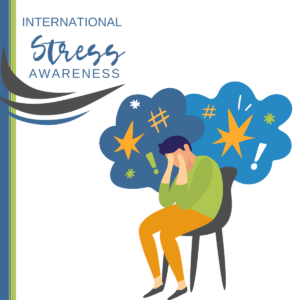 I find it ironic that National Stress Awareness Day falls on the first Wednesday in November, or the day after Election Day. While the United States is known as a stressed-out nation, it was ranked number seven according to the 2018 Gallup survey which found that “more Americans were stressed, angry and worried last year than they have been at most points during the past decade.” The most stressed-out country was Greece, followed by the Philippines and Tanzania. Stress Awareness has developed international momentum, with International Stress Awareness Week (November 2nd – November 6th) devoted to raising awareness of stress management.
I find it ironic that National Stress Awareness Day falls on the first Wednesday in November, or the day after Election Day. While the United States is known as a stressed-out nation, it was ranked number seven according to the 2018 Gallup survey which found that “more Americans were stressed, angry and worried last year than they have been at most points during the past decade.” The most stressed-out country was Greece, followed by the Philippines and Tanzania. Stress Awareness has developed international momentum, with International Stress Awareness Week (November 2nd – November 6th) devoted to raising awareness of stress management.Here are examples of positive stress (eustress):
- Beginning a new job or formal schooling
- Getting a promotion or other outstanding achievement
- Getting married
- Addition of a new baby or family members to the home
- Buying a house
- Taking a vacation
Here are examples of negative stress (distress):
- Death of spouse, close friend, or family member
- Divorce or separation
- Incarceration
- Major illness or injury
- Loss of job or change impacting decrease in finances
- Significant relational conflicts
150 points or less | a relatively low amount of life change and low susceptibility to stress-induced health breakdown
150 to 300 points | 50% chance of health breakdown in the next 2 years
300 points or more | 80% chance of health breakdown in the next 2 years, according to the Holmes-Rahe statistical prediction model
According to The International Stress Management Association [ISMAUK], topics for this year include the following–
- Experiences people have with mental health challenges and what can be done to help them
- How employers are responding to mental health issues and what can be learned
- Campaigning against the stigma associated with stress and mental health issues
- The role of stress management professionals in alleviating stress, with practical and proven techniques for building resilience
- What further actions need to be taken in light of the pandemic and possible changes in future working practices
- Ensuring that those suffering from stress know where to go to seek advice
We’re Here to help
Our wellness experts will be happy to take care of you. You can CLICK HERE to schedule an appointment now or call (612)223-8898.
Meet Clinicians
We’re united by our commitment to providing effective, relevant, and innovative mental health support at all stages of your journey. Click Here to find out more about who we are, where we come from, and how we live out CARE’s mission every day.
The professionals at CARE are actively collecting and creating resources to help with what you need. We’re Here for You.


